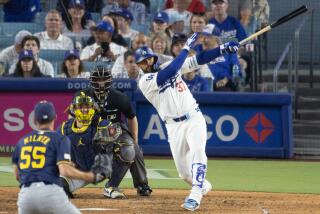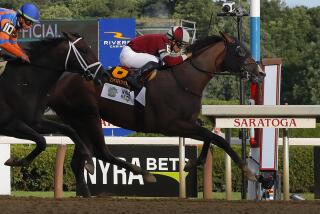125 YEARS OF THE KENTUCKY DERBY : Tracking History
- Share via
LOUISVILLE, Ky. — Luke Kruytbosch, the former Hollywood Park announcer who made his debut at Churchill Downs last week, was worried. On Saturday, he’ll be calling his first Kentucky Derby, and there are a couple of horses with tricky names in the field.
“We’ve got General Challenge and Excellent Meeting,” Kruytbosch said. “They’re both sired by General Meeting. If there’s one mistake I don’t want to make Saturday, I don’t want to call either one of them General Meeting.”
Trainer Bob Baffert could make it easier for Kruytbosch if he runs Excellent Meeting, who’s a filly, in today’s Kentucky Oaks. Baffert said he won’t make up his mind until this morning.
On Saturday, the Kentucky Derby turns 125, and if Kruytbosch botches the call, he’ll provide another chapter in the volumes of trivia about the world’s most famous horse race and the announcers, horses, jockeys and fans who have been a part of it.
Even seasoned announcers and broadcasters who have tackled the Derby have had their bad days.
In 1965, Lucky Debonair won the Derby. Shortly before the race, there was an electrical fire that disrupted power in parts of the track. The sound for the audio on the national telecast was knocked out. Jack Drees called the race anyway, in case the sound came on. But it never did, and the only person who heard Drees’ call of Bill Shoemaker’s ride was the one standing next to Drees.
In 1975, Foolish Pleasure and Prince Thou Art had jockeys who wore similar colors. At the top of the stretch, Chic Anderson, the Churchill Downs announcer, whose call was also carried on national TV, thought he saw Prince Thou Art making a powerful late move.
“Here comes Prince Thou Art!” Anderson shouted.
Trouble was, the horse was Foolish Pleasure, who won the race. Prince Thou Art was never in contention and finished sixth.
A few days later, Anderson was interviewed by Dave Anderson--no relation--of the New York Times. Chic Anderson took the high road. “Hey, I just blew it,” he said.
This was the headline: Prince Thou Ain’t.
Before Anderson and Drees, the very capable Bryan Field handled the national broadcast of the Derby. Field loved martinis, and the day of the 1961 Derby, he had lunch with Jack Price, the owner-trainer who was running Carry Back. Field was drinking triple martinis.
“Bryan,” Price finally said, “there’s 15 horses in the field. It’s tough enough to see them as it is.”
“Don’t worry about me,” Field said.
He delivered one of the Derby’s most dramatic calls:
“Crozier now on the outside in front. . . . Crozier on the lead, and it looks for sure that Globemaster is beaten and so is Four-And-Twenty. . . . And here comes Carry Back, the favorite. . . . Carry Back after Crozier. Crozier with a chance to turn the tables. . . . Carry Back charging, Carry Back coming. Carry Back in front. Carry Back’s gonna win. Here’s the finish--Carry Back by three-quarters [of a length].”
Not bad for a guy on triple martinis.
Mike Battaglia, the former Churchill Downs announcer, remembers how little regard he had for the filly, Genuine Risk, in 1980. When Genuine Risk made her sweeping, winning move on the final turn, Battaglia said: “And here comes . . . here comes . . . Genuine Risk?”
In honor of the Derby’s 125th birthday, it’s time for more Derby minutiae. Put down your Daily Racing Form for a few minutes and play along:
* Who won the first Derby?
Aristides, in 1875. Before a crowd estimated at 10,000, the tiny chestnut colt ran for H.P. McGrath, who had made his money in the California Gold Rush. Chesapeake was considered McGrath’s better horse, but he finished eighth out of 15 horses.
* Who rode the first Derby winner?
Oliver Lewis, an African American. There was only one white jockey in the first Derby, and through the early years, black riders were enormously successful. Fifteen of the first 28 Derbies were won by black jockeys, and Isaac “Ike” Murphy won three. But the Derby hasn’t had a black jockey since 1921. Jimmy Winkfield, the last black jockey to win a Derby, in 1902, later left the country after getting threatening letters from the Ku Klux Klan. Post-Civil War prejudice probably drove black jockeys from the game, and today there are only a few around and only one in Kentucky. “Around the 1920s, they all but disappeared,” said Roscoe Goose, a white jockey who won the 1913 Derby with Donerail.
* Who won the 100th Derby?
Cannonade, in 1974. Trainer Woody Stephens took Pete Anderson off Cannonade, replacing him with Angel Cordero, and Anderson never spoke to Stephens again. Cannonade wasn’t even the best horse in Stephens’ barn. That was supposed to be Judger, who finished eighth.
* Who was the first of only three fillies to win the Derby?
Regret, in 1915. A couple of days before the race, Alfred Gwynne Vanderbilt, who was married to the sister of Harry Payne Whitney, the owner of Regret, was among the 1,200 who died when the passenger ship Lusitania was sunk by a German U-boat off the coast of Ireland.
* Who was the last gelding to win the Derby?
Clyde Van Dusen, in 1929. After the Derby, Clyde Van Dusen bit his stable pony, was kicked in the leg by the pony and never regained his luster. He finished out his life ponying horses for his trainer, who was also named Clyde Van Dusen, in California.
* Who is the oldest living Kentucky Derby winner?
Bold Forbes, winner in 1976, is 26 and living at the Kentucky Horse Park in Lexington.
* Who coined the phrase, “The Run for the Roses”?
Bill Corum, a New York sports columnist. Corum later became president of Churchill Downs from 1950 to ’58.
* How long has Stephen Foster’s “My Old Kentucky Home” been the Derby song?
Probably since 1921. One lyric has been changed. Instead of, “‘Tis summer, the darkies are gay,” it’s now sung, “‘Tis summer, the people are gay.”
* Has the Derby ever been canceled?
No, but it almost wasn’t run in 1945. There was a federal ban on all horse racing, lifted with VE Day on May 8. Hoop Jr. won the race on June 9, the only time the Derby hasn’t been run in May.
* Has the Derby distance always been 1 1/4 miles?
The first 22 Derbies were run at 1 1/2 miles. Ben Brush was the last winner at the longer distance, in 1896, over a track that was officially listed as “dusty.”
* Has a Derby winner ever been disqualified?
In 1968, after Dancer’s Image finished first, he tested positive for phenylbutazone, an anti-inflammatory agent that wasn’t legalized in Kentucky until a few years later. Forward Pass wound up the winner, but only after Peter Fuller, the owner of Dancer’s Image, exhausted his legal appeals in 1972. While the appeals went on, Bobby Ussery, the jockey for Dancer’s Image, was asked by Milo Valenzuela, the rider on Forward Pass, if it wouldn’t be prudent for them to split the jockey’s winning share, no matter what happened. “No, thanks,” the cocky Ussery said. “We’re going to win in court and I’m going to get it all.” Ussery got nothing.
* Which president, while in office, attended the Derby?
Richard Nixon saw Majestic Prince win in 1969. Since Nixon, former presidents Gerald Ford, Jimmy Carter and George Bush have gone to the Derby.
* Who is the only horseman to win the Derby as a jockey and a trainer?
Johnny Longden. He rode Count Fleet in 1943 and trained Majestic Prince in 1969.
* Has a Derby winner or a Derby fan ever been buried at Churchill Downs?
Technically, no. But many people have requested that the ashes of deceased be spread across the finish line. Churchill Downs has done this on occasion, but really doesn’t want to. Butch Lehr, the track superintendent, says that on windy days, the ashes can carry to the turf course and kill the grass.
* Who was the worst horse ever to run in the Derby?
This vote goes to Great Redeemer, who finished last in 1979, beaten by 84 1/2 lengths. Winless going into the Derby, Great Redeemer finished so far behind the next-to-last horse that a group of photographers, running across the track to reach the winner’s circle, almost got wiped out. The photographers thought the horse before Great Redeemer had been the last to the finish line. The horse’s jockey, Richard de Pass, had to steer Great Redeemer through the photographers to avoid them. “They sort of ducked me,” De Pass said. “And they laughed when they saw me.”
(BEGIN TEXT OF INFOBOX / INFOGRAPHIC)
The Field
Post positions for Saturday’s 125th running of the Kentucky Derby:
*--*
PP Horse Jockey Trainer Odds 1. Adonis Jorge Chavez Nick Zito 30-1 2. Three Ring John Velazquez Eddie Plesa 20-1 3. Ecton Park Robbie Davis Elliott Walden 12-1 4. Stephen Got Even Chris McCarron Nick Zito 12-1 5. a-Aljabr Daragh O’Donahue Saeed bin Suroor 12-1 6. b-Excellent Meeting Kent Desormeaux Bob Baffert 3-1 7. Desert Hero Corey Nakatani Richard Mandella 15-1 8. Answer Lively Craig Perret Bobby Barnett 50-1 9. Valhol Willie Martinez Dallas Keen 12-1 10. K One King Alex Solis Akiko Gothard 12-1 11. Cat Thief Mike Smith Wayne Lukas 8-1 12. a-Worldly Manner Jerry Bailey Saeed bin Suroor 12-1 13. Kimberlite Pipe Robby Albarado Dallas Stewart 12-1 14. Prime Timber David Flores Bob Baffert 7-2 15. b-General Challenge Gary Stevens Bob Baffert 3-1 16. First American Eddie Delahoussaye Eduardo Caramori 12-1 17. Charismatic Chris Antley Wayne Lukas 20-1 18. Vicar Shane Sellers Carl Nafzger 6-1 19. Menifee Pat Day Elliott Walden 5-1 20. Lemon Drop Kid Jose Santos Scotty Schulhofer 12-1
*--*
a-entry; b-entry; mutuel field comprises Lemon Drop Kid, K One King, Kimberlite Pipe, Valhol and Ecton Park
Weights: Excellent Meeting and Three Ring 121 pounds, others 126 pounds. Distance: 1 1/4 miles. Purse: $1,201,200 if 20 start. First place: $901,200. Second place: $170,000. Third place: $85,000. Fourth place: $45,000. Post time: 2:30 p.m. PDT.
DERBY COVERAGE
* RANDY HARVEY: Sheikh Mohammed’s lightly raced entry of Worldly Manner and Aljabr adds an air of mystery to the Derby. Page 2
* PUTTING IT OFF: Bob Baffert won’t make a decision about running Excellent Meeting in Derby or Oaks until this morning. Page 14
More to Read
Go beyond the scoreboard
Get the latest on L.A.'s teams in the daily Sports Report newsletter.
You may occasionally receive promotional content from the Los Angeles Times.










